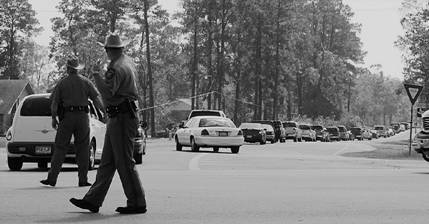|
|
Evacuating Disabled, Elderly Remains High
Storm Priority
The Jasper Newsboy
Texas, USA
June 6, 2007

Residents who stayed through Hurricane Rita in 2005 had to endure long lines to gain food, water and ice for the days following the storm
Plans are in place to better accommodate people evacuating in their own vehicles, according to emergency management coordinator Billy Ted Smith, however, even more planning has been invested in people who cannot leave on their own.
At the fifth Texas Hurricane Conference held recently in Gavleston, half the work groups dealt with plans to get the elderly, disabled and homeless safely evacuated to shelters prepared to deal with their needs.
Those plans include ambulances or air evac for the "medically fragile," school and charter buses, and in areas like Houston/Galveston and Beaumont/Port Arthur, railroad evacuation.
Ideally, those without transportation will have a plan to evacuate with family, friends or church members, but when that's not an option, Smith's office offers people living at home (nursing homes have their own plans) the opportunity to register for evacuation by calling 211.
Emergency management services will prioritize evacuating special needs individuals who have registered prior to the storm, according to Smith. It is important that people call 211 and register before a hurricane enters the Gulf of Mexico; to put it bluntly: now, today, as soon as possible.
It's a long form that requires answers to personal medical questions, but evacuation shelters don't supply nursing care or life support equipment. If an individual needs an extra level of care, the 211 operator needs to know so that placement in an appropriate health care facility can be arranged.
211 operators can also help with planning by providing information on food, shelter, childcare, senior services and disaster relief. Help is available 24 hours a day in more than 90 different languages.
One workshop at the hurricane conference dealt specifically with communicating information with the deaf, hard of hearing, and blind, a labor-intensive proposition during a time when other emergency preparedness measures are being activated.
"We will use volunteer firemen, law enforcement, commissioners' employees - in a worst case scenario we will do everything possible to get everyone out," Jasper County Judge Mark Allen said.
Nursing homes, assisted living facilities and hospitals now have their own evacuation plans, but not many did before 2005.
At Avalon Place in Kirbyville, administrator Liz Rice said, "We are now required to have a state approved evacuation plan that includes a contract or letter of agreement for transportation, such as busses, and for an accepting facility who can care for our patients.
"If we have to leave, our plan is to go north to Broken Bow or Ida Bell, OK, until power is restored. We have a list of staff who will evacuate with us, and another list of community volunteers who have said they will help.
"We are better prepared than we were (for Rita). In Kirbyville, we never evacuated before, and were never required to have an evacuation plan because we never thought we'd have to leave.
"Last time we were able to get our residents out because the community pulled together for us. At 1 p.m., when they called for evacuation, we didn't know what we would do. Billy Ted (Smith) arranged school buses for us, and we found a home in Oklahoma that could take us, but we still needed to pack up and put our people on buses.
"JNEC sent 10 or 15 linemen, and members of the community turned out to help us load up. By 9:30 p.m. we had a destination and were rolling, but it was only because people came and helped.
"We are definitely better prepared for the next time," Rice said.
Paula Moore of Lakes Area Hospice said, "Our clients aren't residents in a central facility; for the most part they live in their homes with assistance from our staff. What we do when we admit a patient is have a package on how to access the 211 help before a hurricane enters the Gulf. We keep on file their local emergency contact and another contact at least two hours away.
"When a storm enters the Gulf, we start calling to see if they have made arrangements with family or friends. Last time, most of our clients had. We only had about 10 who needed us to help them find a nursing home."
By definition, people who have entered hospice care are terminally ill, usually with less than six months to live.
"Our experience with our patients is they say, 'I'll think about it only if I absolutely have to.' But if they suddenly need it, we've made sure they have everything in their package they would need," Moore said.
Mark Durand of Christus Jasper Memorial Hospital says they have made several changes to be more prepared.
"We now have a generator big enough to power the entire hospital," Durand said. They also have evacuation plans within the Christus network to partner with sister hospitals in Texarkana and Shreveport. With sufficient notice, those facilities will send buses and ambulances to aid with evacuation.
"The most serious patients, of course, can be taken by helicopter," Durand said.
More
Information on Armed Conflict in the Americas
More
Information on Armed Conflict in Other Areas
|
|



